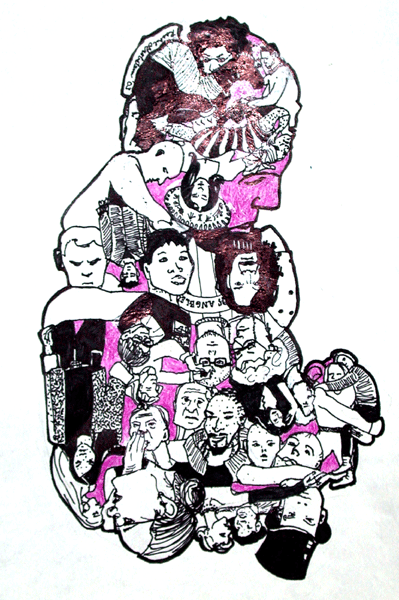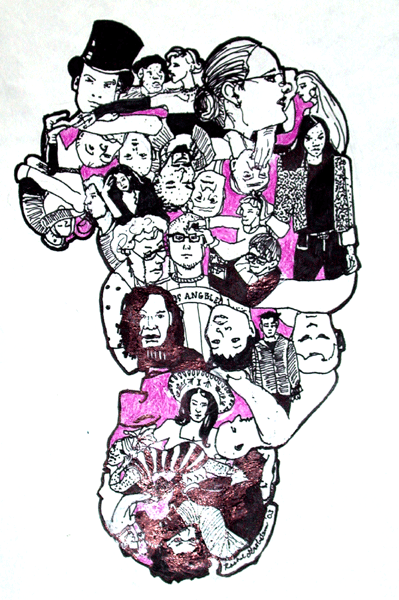Made available on Serendip
In association with Making Sense of Diversity: An Exploration, a world wide conversation

|
September 23, 2005
Christina Gubitosa, Molly McTague, Li Huan Lai, Anka Wilk, Nell Anderson and Jody Cohen
College as a Choice:
Blue Collar Roots, White Collar Dreams
Participants
Summary
Prepared by Anne Dalke
Additions, revisions, extensions are encouraged
in the On-Line Forum
| 
|
Nell opened the discussion by summarizing the talk that Alfred Lubrano had given the night before, about the often painful conflicts experienced by "straddlers," students from blue collar families who cross socio-economic and cultural divides when they come to college in pursuit of "white collar dreams." Four students then spoke of their own experiences coming from working class backgrounds to study at Bryn Mawr; they described the "complexities of being blue color," their sense of "not being quite in," of "not quite fitting," of having "viewpoints that weren't quite right." Cultural differences made joining conversations difficult. The sense that most of the personal experiences described in classrooms are pretty similar ("those are the people who talk") led to a perception that the views of working class people were not in the majority here. Students from blue color neighborhoods are homesick for what is familiar. But when they go home and try to talk about what they are learning in school, they may be put down for being "too smart," or a "proper white girl," by friends who are not in school, but instead "living grown up lives."
Participants added a range of other perspectives and experiences:
- "there aren't enough working class people here to justify" Bryn Mawr's bringing in a speaker about class issues
- casual comments by wealthier classmates reveal false assumptions that everyone has equal access to resources
- working class students should take on the challenge of taking roles as leaders
- there is no "working class club" on campus, no built-in support
- but how could such a club provide a support system AND be inclusive?
- there's "surprising acceptance and kindness" here, for students from poorer backgrounds
- "oh, no, you feel the difference in subtle ways"
- "to protect myself, I refuse to speak or form an opinion"
- but you can be an advocate without bringing in your own story
- there is a perception that "you should feel privileged to be here; why whine?"
- @ home, there is the potential embarrassment of not having a nice house; you can blend in better here, because everyone lives in the dorms
- racial identity is more visible than class identity
- "I was much too young and far too stupid to be in this conversation," about what it means to be from a "family with no expectations, only wishes"
- I found out that being successful is "not just about desire and hard work"
- there is a disconnect between what I have and hope to accomplish, and the lives and accomplishments of my family and friends
- it's "not sensitive" to refer (for instance) to an "Elizabeth Bennett moment," in a group of people who are not likely to have read Pride and Prejudice; the reference would not be a "bat in their bag"
- but how do you share without giving offense? you become guarded
- in the end, what matters is family, a common ground
- it's not about comparison, it's about understanding
- you become defensive of other people's differences, find yourself standing up for the sort of people you don't even talk to at home
- in an economics class, description of third world cultures doesn't acknowledge the humanity of the people involved; professors and students don't realize "how it sounds to people with that background"
- there are two things going on: economics and class
- "I'd prefer a vacation in Dorchester to one in the Hamptons"
- working class people have different cultural associations; these are positive features, as potential contributions to and extensions of Bryn Mawr's culture
- "I want to personally discourage you from trying to blend in"
- never hide, wear your own background as a badge of honor
- "it's all in the way you present yourself: speak the way you know how"
- you can speak differently to your grandmother than to your professor; you don't have to condescend
- don't be impressed by the rich
- but it's not that simple: Lubrano described college as the place, and education as the way, that blue collar becomes white collar.
Jody closed the conversation by thanking all participants for "allowing us to complexify this 'straddler' notion," and reminded us of the brave stories we started with. There are different experiences here, and it is valuable for us all to know about them.
The discussion is invited to continue further in the on-line forum on "Making Sense of Diversity," and will resume in person at noon next Friday, September 30, when Amy Craiger, Val Jankowski and Jackney Prioly will lead a discussion about "Governing Ourselves:
Does the System Support Everyone?"
| Return to Schedule for Friday Noon Conversations

| Bryn Mawr Conversations
| Archived
Forum
| Archive of Bryn Mawr Conversation
| General Conversation
| Serendip Home |
These pages are sponsored by the Bryn Mawr College Office
of Intercultural Affairs, the Center for Science and Society and the Serendip
website. Send us additional comments or suggestions at Serendip
© by Serendip 1994-
- Last Modified:
Wednesday, 21-June-2005 15:18:00 EST

